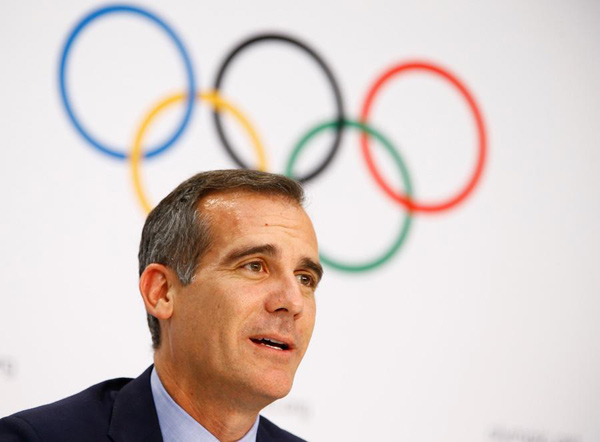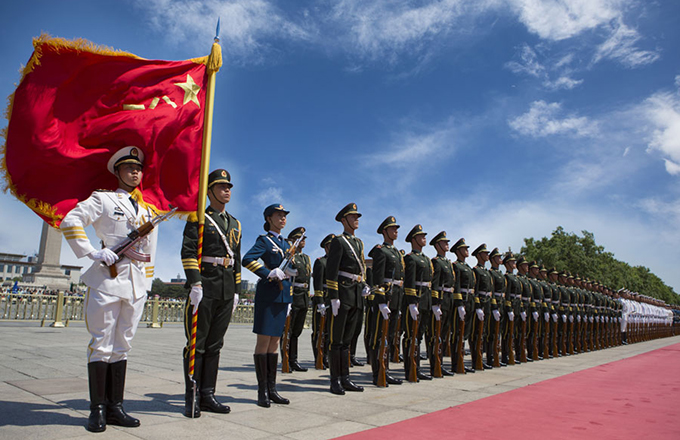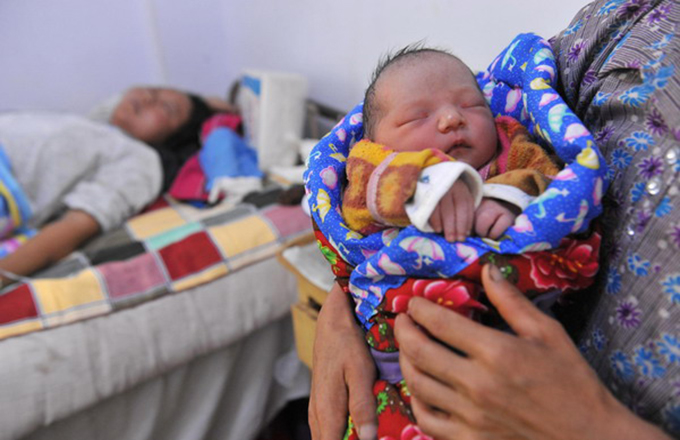Declining hosts a test for Olympics
 |
|
Mayor of Los Angeles Eric Garcetti attends the press conference after the voting during the International Olympic Committee (IOC) extraordinary session in Lausanne, Switzerland July 11, 2017. [Photo/Agencies] |
The simultaneous awarding of the 2024 and 2028 Summer Olympic Games to Paris and Los Angeles was met with cheers in the respective host countries. Indeed, both cities should be commended for pursuing Olympic bids in a cooperative manner. But the surface-level rosiness of the reaction to Monday's announcement belies the serious challenges ahead for the Olympic movement.
The dual-award announcement was preceded by a bidding process for the 2024 Games that was full of stumbling blocks from the outset. A slew of cities aspiring to host the 2024 Games dropped their bids early on, including three European cities (Budapest, Rome, and Hamburg) and one US city (Boston). This left only Paris and Los Angeles in the running. The story was similar prior to the awarding of the 2022 Winter Olympic Games, with only two cities in contention by the time the International Olympic Committee met to declare Beijing the host over Almaty.
The simultaneous awarding of the 2024 and 2028 Games was less a stroke of genius on the part of the IOC than it was a fait accompli. The IOC almost certainly anticipated that only some cities would be falling over themselves to host the 2028 Olympics, so it decided to kill two birds with one stone.
Very few cities, it seems, really want to host an Olympics, because hosting the Summer or Winter Games is an expensive proposition that can test the limits of even the world's most developed countries. To host the Games, a country requires massive capital investment up front, infrastructure construction on a mind-boggling scale, and a high level of logistical and technical expertise that must be maintained (in the form of paid staff) for years ahead of the actual event.
The total cost for hosting an Olympics can be tens of billions of dollars. With economic inequality on the rise and wage stagnation gripping most developed economies, it is not surprising that taxpayers in countries across the world have little appetite to host such expensive events.
The cost of the Sochi 2014 Winter Games in particular-despite most analysts viewing the case as an exception-has prompted prospective host cities to view it not as a long-term investment, but as a long-term money sink that will burden a city and its taxpayers for years to come.
Looking beyond 2028, it will be rough going for the Olympic movement unless the IOC can think outside the box and devise creative ways to make hosting the Games an attractive proposition again for cities and countries. Several steps can be taken in this regard.
First, to renew interest in hosting the Olympics, more cities that have successfully hosted the Games can be encouraged to do so again. As the 2022 Winter Games' host, Beijing is set to demonstrate how venues can be remodeled and reused for future Olympic editions-only a handful of new sites are being built, with most of the action set to take place at the 2008 Summer Games' venues. This shift in attitude would go a long way toward securing long-term interest in the Olympic movement.
Second, the IOC can encourage bids for the Games that are not confined to a single, large city. By hosting the Games in several cities, instead of just one, a country can help divide the expenditure on building infrastructure and transportation networks, which will benefit the maximum number of people in the long term. This way, even the economic benefits can be spread out among the host cities.
Beijing is an ideal example in this regard, as the 2022 Games co-host Zhangjiakou in neighboring Hebei province is expected to greatly benefit from the high-speed rail corridor being built between the two cities for the event. In fact, the economic benefits of the infrastructure construction in Zhangjiakou are already being felt, as tourists are flocking there and to surrounding areas in winter to enjoy time on the slopes.
Hosting an Olympics can be an attractive proposition again for cities and countries if the Games can help improve the lives of the local people in a real, tangible way. If the IOC can devise ways that will enable potential benefits to be shared by a larger number of people, and to make sure the gains are realized in a sustainable, cost-effective way, it will find prospective host cities once again beating a path to its door.
The author is a sportswriter of Xinhua News Agency.
- Association applies to add mahjong to Winter Olympics
- Paris 2024 Olympics nearly assured as Los Angeles agrees to 2028 Games
- Sustainability key to Olympics efforts
- Winter sports tourism escalates in China after 2022 Winter Olympics bid
- Intel would like to work with Alibaba on Olympics
- 2022 Olympics plans praised by inspectors



















